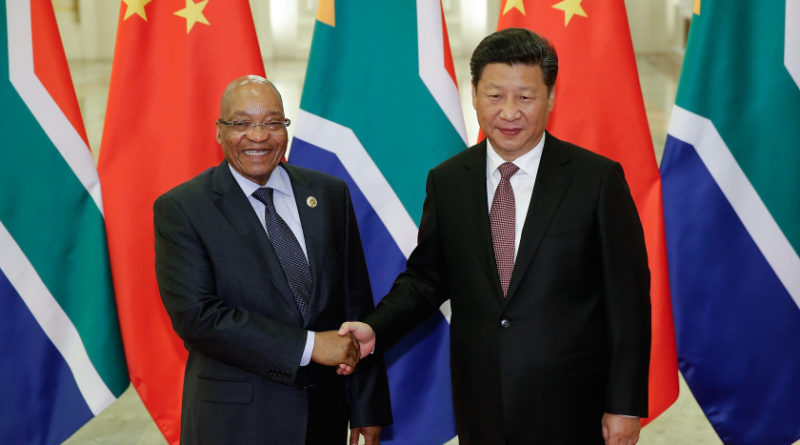China’s unfair Trade with Africa Undermines Governance
China is Africa’s leading business partner, with $220 billion trade, and the largest source of direct investment. While the trade between America and Africa is only $80 billion.
China’s growing economy needs natural resources: oil and minerals, and Africa has an abundance of it. China is buying Africa’s commodities; in return China is building infrastructure development: ports, transnational highways, railways, communications depots, hospitals, and schools. This infrastructure development has helped Africa to some extent.
This week, China has completed a 750 km electric rail way connecting Addis Ababa, Ethiopia’s capital, to the Red sea state Djibouti. The cost of the railway is $ 3.6 billion and was financed by the Export and Import Bank of China. The railway would improve the landlocked Ethiopia’s access to Djibouti’s port, which handles 90% its imports and exports goods, by reducing the delivery time from three days to 9 hours.
For the first five years, Chinese Engineers and technicians will run the train. After that the Ethiopian staff will takeover.
However, China’s lopsided trade with Africa is not benefiting the ordinary Africans. The Chinese investments in Africa have created little or no local jobs, transfer skills or improve the local economies.
China uses a bartering scheme where its trading partners use their natural resources to pay their infrastructure projects loans.
Moreover, China uses infrastructure developments, which are direly needed in Africa as an incentive to attract economic, diplomatic, and political cooperation from African countries.
China also has a policy of “non-interference in internal affairs”, which bolster the power of Africa’s despots. Because China has kept a blind eye on the rampant corruption and the human rights abuses plaguing its trading partners in Africa.
Critics of the China and Africa trade relationship argue that China’s investment undermines good governance, human rights, and environmental standards.
For example, China has not only offered billions of investment and access to cheap loans, but also provided weapons for the rogue regime in Sudan—–a government that has been accused of genocide in the Darfur region. In fact, China even built a $ 25 million Villas for Sudan’s military dictator, Omar al-Bashir. Moreover; China is also supporting unconditionally the repressive governments of Ethiopia, Zimbabwe and others in Africa.
China’s asymmetrical trade with Africa is not China’s entire fault. The African governments are to blame for failing to make sure China’s investments are beneficial for both sides. However, nowadays, African countries are fighting back against Chinese companies’ over poor safety standards, lack of environmental practices, and shoddy work.
What Africa also needs to understand is today’s China is not the Communist China of the 60’s who came to Africa to help liberation movements. Today, China with its disciplined one party system, and deep pockets, is merely investing for profit motives and its own interests.
Fair trade is good for Africa, but Africans’ interests should determine its trade with China.
For Africa, exporting commodities to China or the rest of the world is not sustainable. What Africa needs is to develop its added value agro-businesses industry. Africa should also start manufacturing products for local consumption, to create jobs for its growing young people.
But, first, Africans must tackle the problems of bad governance, rule of law and corruptions that are hampering for Africa to attract investment to develop its resources and infrastructure.
Take for example the massive corruption that is Nigeria’s oil sector. Nigeria, Africa’s leading oil producer, is pumping up 2.5m barrel per day, but imports 80% of its refined petroleum products. Four government refineries lack maintenance and are in ruin, because of corruption and mismanagement. Refining their oil, building petro-chemicals industries, Nigeria and other African countries, can generate more revenue for development and other infrastructure, and create more local jobs.
Africa has survived from European colonialism, cold war and the military coups. And to move Africa forward, its democratic leaders, like President Buhari of Nigeria, must improve the governance, crackdown on corruption, initiate economic reforms, develop the skill of its work force, and investment its infrastructure.
Despite Africa’s wealth in natural resources, many Africans are living in abject poverty. China and others can help; ultimately, the Africans must take responsibility for the plight of their continent.
Africa has a great potential and challenges. Africa has one billion people who are mostly young. It has up to 60% of the uncultivated agricultural lands and 40% of minerals deposits in the world.
Transforming Africa will be challenging and would require patience. China has an opportunity to help the African people and its leaders to develop Africa. But, the current trade deal between China and Africa should be based upon mutual benefits, respect of human rights, the rule of law, and needs to be transparent and accountable—something that both Chinese and African leaders have failed to do so.
This Op-ed originally appeared in the Hill, and was written by Ali Mohamed, co-founder of the Horn of Africa Freedom Foundation, Lewis Center, Ohio. He can be reached @ aliadm18@gmail.com

